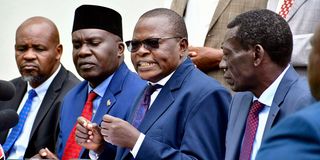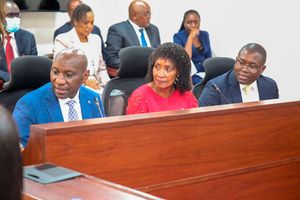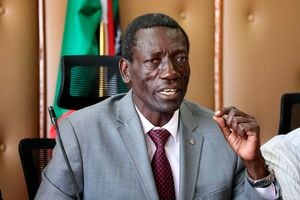
Kuppet Secretary General Akello Misori (second right) gestures during a joint media briefing with officials from Knut on August 07, 2024 in Nairobi. Teachers in hardship areas want their hardship allowance pegged at 40 per cent of their basic salary
Teachers working in hardship areas have demanded the incorporation of enhanced hardship allowance in the collective bargaining agreements that are expected to be signed before June 30, 2025, when the current ones expire.
The teachers, under the Kenya Teachers in Hardship and Arid Areas Welfare Association (KETHAWA) lobby, are demanding that the hardship allowance be reviewed upwards and pegged at 40 per cent of their basic salary. They argue that this is the only allowance specific to their work conditions and that failing to adjust it would amount to continued discrimination.
In a statement, KETHAWA expressed outrage over what they termed as persistent exclusion from key negotiations that affect their welfare, even as other allowances such as basic salary, house, commuter, and subsistence allowances are being considered for review.
“It has come to our notice that the Kenya Union of Post Primary Education Teachers (Kuppet) has tabled proposals on basic salary, house allowance, commuter and subsistence allowances—yet, once again, there is no mention of an increment in hardship allowance,” said Wangonya Wangenye, KETHAWA, national secretary.
The lobby accused Kuppet of neglecting the plight of teachers deployed in remote and harsh environments, despite their crucial role in delivering education under challenging circumstances.
“As much as we appreciate the union's legal mandate to negotiate on behalf of teachers, we view the omission of hardship allowance as outright discrimination and a constitutional violation of our members’ rights,” said Mr Wangenye.
According to the teachers, the current hardship allowance is outdated and does not reflect the daily struggles they endure, including insecurity, poor infrastructure, and lack of basic amenities.

Outgoing Teachers Service Commission Chief Executive Officer Dr Nancy Macharia.
“We shall not sit back as discrimination, backdating many years, is perpetuated against our members, any future review of hardship areas must involve consultation with their association,” Mr Wangenye said
According to the proposed demands for the CBA (2025-2029), Kuppet has not proposed any change to the hardship allowance. Currently, teachers in the lowest cadre (Grade B5) receive Sh6,600, while those in the highest grade (D5) are entitled to Sh38,100.
“In light of the above and as an association representing these teachers, we propose this allowance to be increased just like any other allowance and pegged at the rate of 40 percent of the basic salary. Please note we had made similar input in our letter to you dated 14th April 2023 which should also be incorporated in the final CBA affecting members of our association. Any review of hardship areas must also be done in consultation and concurrence with our association,” Mr Wangenye said in a letter to the CEO of the TSC, Nancy Macharia.
Historically, hardship allowances for teachers have varied significantly. In 2019, the lowest-paid teachers received approximately Sh3,055 per month, while the highest-paid earned up to Sh13,479. Subsequent adjustments saw these figures rise, with some teachers receiving between Sh10,900 and Sh38,100. However, KETHAWA maintains that these amounts remain insufficient given the harsh conditions in which their members operate.
“Take not that failure to incorporate our input in the 2025 to 2029 CBA will be met with all manner of lawful resistance from teachers working in hardship and arid areas as we shall not sit back as discrimination backdating many years back is perpetuated against our members. Your quick and prompt action is hereby called for,” he said.









